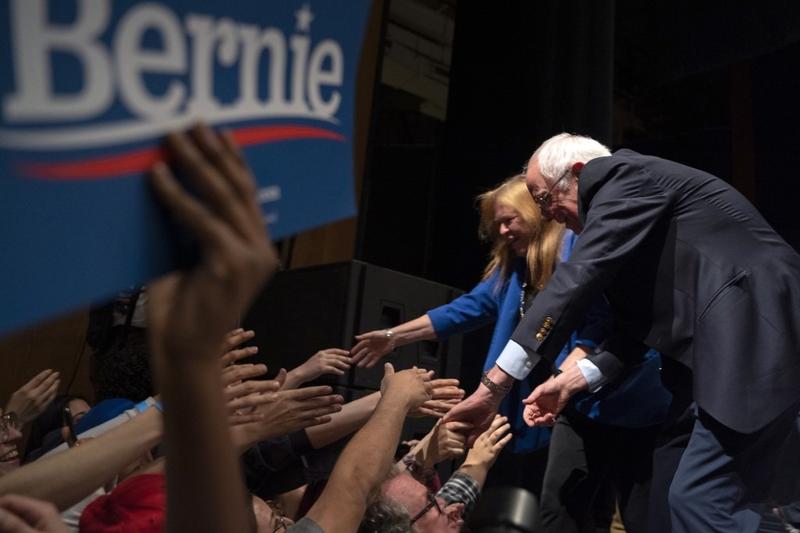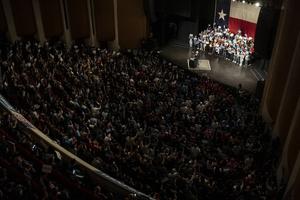 Democratic presidential hopeful Vermont Senator Bernie Sanders (R) and his wife Jane O'Meara Sanders shake hands with supporters after Sanders addressed a rally at the Abraham Chavez Theater on Feb 22, 2020 in El Paso, Texas. (PAUL RATJE / AFP)
Democratic presidential hopeful Vermont Senator Bernie Sanders (R) and his wife Jane O'Meara Sanders shake hands with supporters after Sanders addressed a rally at the Abraham Chavez Theater on Feb 22, 2020 in El Paso, Texas. (PAUL RATJE / AFP)
Bernie Sanders won the Nevada caucus Saturday, cementing his place as front-runner of the crowded field of Democratic presidential contenders.
Sanders had a sizable lead in the initial vote counting. Joe Biden trailed but was holding in second place, which marked a rebound for him from embarrassing losses in Iowa and New Hampshire.
Sanders claimed victory from San Antonio, Texas, noting the diverse coalition that gave him the win.
READ MORE: Sanders narrowly wins in New Hampshire Democratic primary
Two thirds of Nevada caucus-goers said they preferred a single-payer health system like Sanders’ Medicare for All
“In Nevada we have just put together a multi-generational, multiracial coalition which is not going to only win in Nevada, it’s going to sweep this country,” he said.
Nevada was the third straight contest in which Sanders won the popular vote. Five other candidates split the half of voters who were not supporting Sanders, making it difficult for them to win the 15 percent minimum support needed to win delegates.
Entrance polls broadcast on CNN suggest Sanders had broad support across almost all demographic groups — especially Latinos, which gave him 53 percent support. Biden won among Nevada Democrats 65 and older and among African Americans.
Sanders also took two-thirds of voters under 30 and nearly half of people between 30 and 44 years old, the entrance polls showed.
Sanders, a self-described democratic socialist, also dominated caucus goers who describe themselves as very liberal or somewhat liberal, well ahead of his progressive rival Elizabeth Warren. He was even ahead with those who said they were moderate or conservative, with 25 percent support, edging Biden, who had 23 percent.
Two thirds of Nevada caucus-goers said they preferred a single-payer health system like Sanders’ Medicare for All. Sanders won about 49 percent of those voters, according to entrance polls.
Biden took the stage in Las Vegas and called his second-place standing a win. He said he would seize the momentum and win in South Carolina next week.
ALSO READ: Buttigieg wins most Iowa delegates after party reviews votes
“I’m a Democrat for a simple reason. I ain’t a socialist, I ain’t a plutocrat. I’m a Democrat. And I’m proud of it,” he said. “I think it’s time we get moving. I think it’s time we unite the party first.”
Buttigieg, who was in third place in early results, also called for party unity, but not behind Sanders, whose strict progressivism he said “leaves out most Democrats, not to mention most Americans.”
 Democratic presidential hopeful Vermont Senator Bernie Sanders gestures as he speaks during a rally at the Abraham Chavez Theater on Feb 22, 2020 in El Paso, Texas. (PAUL RATJE / AFP)
Democratic presidential hopeful Vermont Senator Bernie Sanders gestures as he speaks during a rally at the Abraham Chavez Theater on Feb 22, 2020 in El Paso, Texas. (PAUL RATJE / AFP)
“Before we rush to nominate Senator Sanders as our one shot to take on this president, let’s take a sober look at what’s at stake,” the former mayor said.
“I believe the only way to truly deliver any of the progressive changes we care about is to be a nominee who actually gives a damn about the effect you are having, from the top of the ticket, on those crucial, front-line House and Senate Democrats running to win, who we need to win, to make sure our agenda is more than just words on a page,” he said.
Nevada’s caucus comes on the heels of the Iowa debacle, which left everyone waiting days for final results. And while Nevada party officials took pains to avoid a repeat, the results came in slowly and it may take a while before it’s clear how many delegates Sanders and the others won.
At stake are 36 pledged delegates to the national convention of the 1,991 needed to secure the party’s nomination. More important than delegates, each win gives candidates momentum going into later contests.
President Donald Trump’s campaign was already relishing the prospect of facing Sanders in the fall.
“There is no denying that big government socialism dominated again as Bernie Sanders remained the leader of the leftist pack,” said a statement from Brad Parscale, Trump campaign manager.
There were two late developments in the days before the caucuses: A feisty Democratic debate and a report that intelligence officials briefed the Sanders campaign on Russian efforts to help his candidacy.
The impact of those events was likely blunted by Nevada’s first caucus early voting. Almost 75,000 people — including 10,000 newly registered Democrats — voted beginning last weekend.
Buttigieg is the only other Democrat who’s won a contest, with his narrow victory in Iowa. Biden and Warren finished far back in the pack in the first two contests, and both were seeking strong results to springboard into the 14 races on March 3 – states that include Texas, North Carolina, Minnesota and the biggest prize: California.
Warren had hoped her strong debate performance this week in Las Vegas would inspire Democrats to give her a second look. Her main target that night, Michael Bloomberg, didn’t contest Nevada but is spending unprecedented sums on advertising on states voting after South Carolina.
This year, Nevada allowed for early voting in which people could rank their top three candidates, with the option of ranking up to five. About 77,000 Nevadans filled out ballots early. The number of early voters was almost as many as the total who caucused in 2016, when 84,000 people came out support a candidate.
One thing Saturday’s vote will not settle is where Bloomberg – and his hundreds of millions of dollars – will land in the Democratic race. He is not on the ballot in Nevada, although he appeared in the most recent debate there by getting more than 10 percent in four national polls.
The former New York mayor has already dropped more than US$468 million on advertising around the country and despite a widely panned debate performance, will be a factor in the race once he appears on ballots starting on Super Tuesday, March 3.


